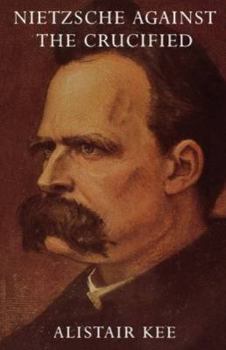Nietzsche Against the Crucified
Nietzsche dismantled the Christian religion, which he regarded as an obstacle to life, and committed himself with passion to his philosophical faith. This new study gives proper attention to the deeply religious aspects of Nietzsche's life and thought.
Format:Paperback
Language:English
ISBN:0334027837
ISBN13:9780334027836
Release Date:October 1999
Publisher:SCM Press
Length:226 Pages
Weight:1.75 lbs.
Dimensions:0.7" x 5.4" x 8.5"
Customer Reviews
1 rating
The theologian gets his turn at hermeneutics
Published by Thriftbooks.com User , 22 years ago
I managed to finish Kee's Nietzsche against the Crucified last week, and here are the thoughts that have slowly percolated through my brain as i read the book. His writing style was generally terse and at times, profound and illuminating. There's a quesiton of how much Kee's theologian insights contributed to his reading, and it appears to me that Kee lends a sympathetic ear to a "christian" reading of Nietzsche. According to the person who recommended this book, his understanding of Nietzsche is that religion has always fulfilled our "presuppositions" or psychological need for teleology, for purpose, but those who lost their faith in God still have that need of teleology and in order to satisfy it, they usually find another center. Whoever is truly irreligious will lack a center, and their lives will be total chaos. Since the most of us lead a stable life, we remain religious. As for atheism, it is oddly true that Nietzsche never really discusses the atheist-theist question in his writings on the epistemological level. Kee takes his announcement of the death of God as a cultural fact, not an epistemological one. That we have lost our belief in God has severe repercussions in our lives, and only those who are truly perceptive will recognize that. This loss of belief demonstrates the exact location of the actual foundation of all our beliefs of morality, science, knowledge, everythying- and it is in religion. So, this existential experience of utter nihilism is a tragic one, but also a means to freedom. Where the typical postmodernist stop Nietzsche invents a grand narrative, the Eternal Return of the Same (a psychological doctrine or existential mandate that equals the power of Kant's Categorical Imperative). His insight of the Eternal return is a religious one, according to some letters and other notes ("it came to me" or "thunderstruck" etc). Kee tries to persuade the reader that Nietzsche chose the word "eternal" because it was religious, as opposed to the mathematical or scientific synonym, "infinite." There's not much to go on here, though. I agree with the distinction Nietzsche makes between Christ and Christendom, though, and it always has helped me gain slipperiness in the inevitable discussion with the friendly neighborhood devout bible thumper. Well, after reading the book i had to really question the legitimacy of the exegesis of Nietzsche's corpus because some of the extrapolations are overheated speculation built upon stilts. There's more, but there's a lot to be said about the justified exegesis itself though, and this book offers a fairly persuasive case of Nietzsche as a truly religious thinker.






